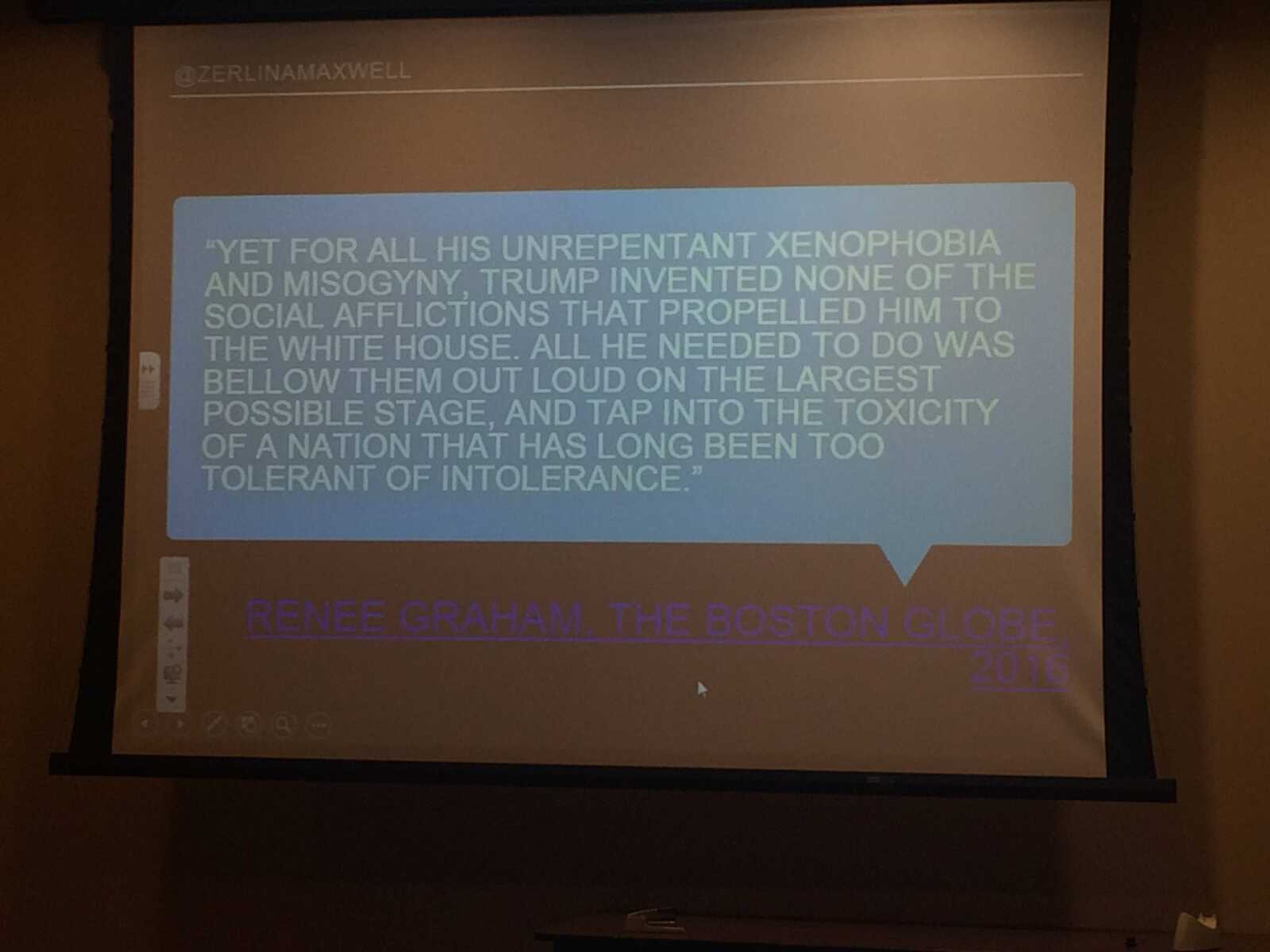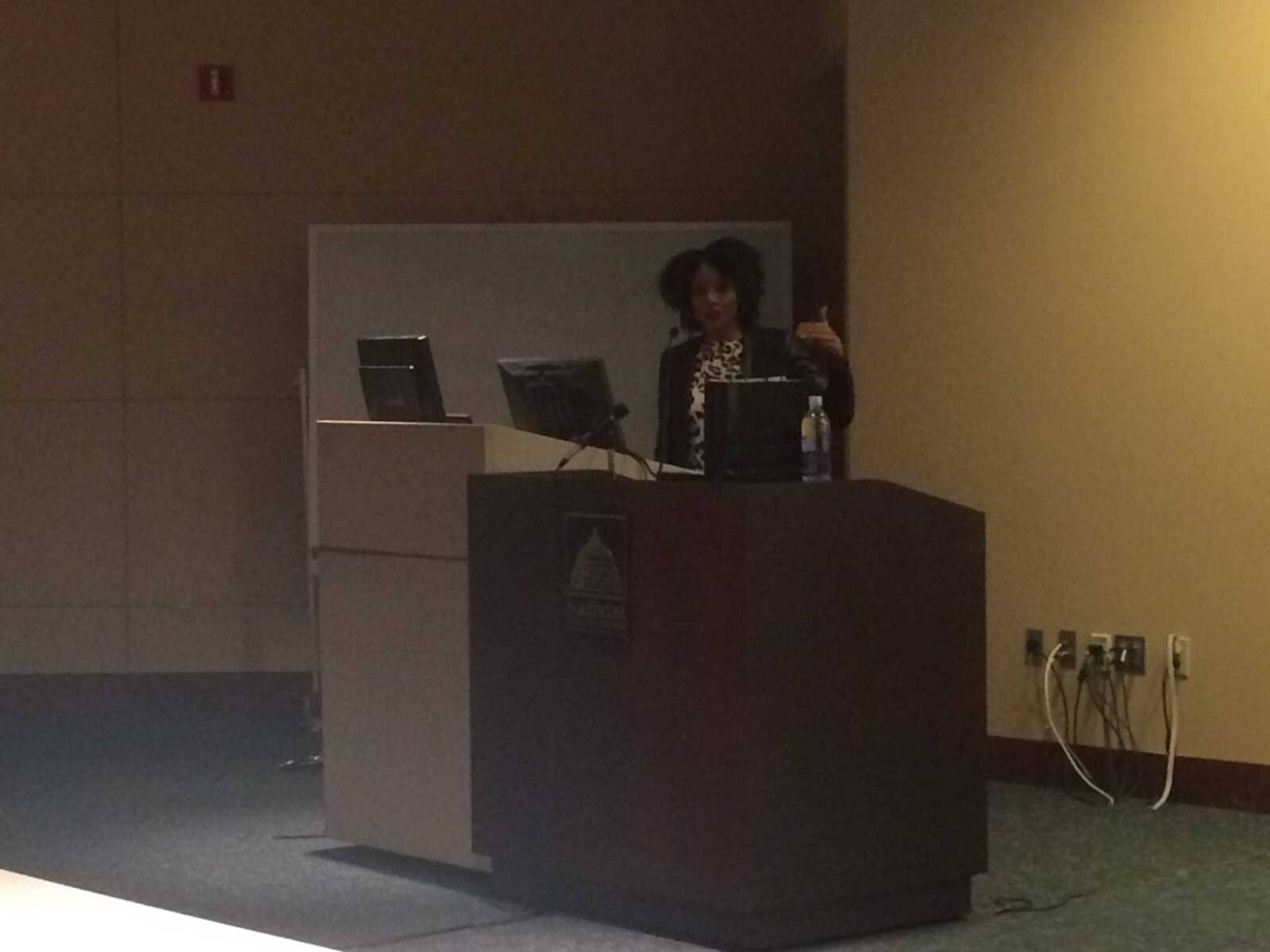Zerlina Maxwell presented “The 2016 Election and the Normalization of Hate” at the 21st annual Michael Davis Lecture Wednesday in Glenn Auditorium at Southeast Missouri State University.
The presentation focused on the normalization of racism and sexism as they pertained to this past election and how rape culture became a subject of conversation throughout the election season.
“If we pretend it’s not a problem, it’s not going to get resolved,” she said.
Maxwell is a political analyst, writer and former director of progressive media for Hillary Clinton during the 2016 presidential campaign. She has had features in The Washington Post and on CNN and has made frequent appearances on MSNBC and FOX News. Many of the speeches she gives focus on sexual violence and inequality with women and minorities.
“This presentation is essentially a bipartisan presentation,” she said. “I’m talking about racism, and I’m talking about sexism and I’m talking about that in the context of the election, but it’s not inherently a political talk.”
During Clinton’s campaign in summer 2016, she said the staff noticed then-presidental candidate Donald Trump seemed to be making racism acceptable.
“It’s not just that he’s saying racist things, he’s actually normalizing it,” Maxwell said.

She played a clip that demonstrated how supporters at Trump rallies fumed at different groups of people and threw out the ones they felt didn’t belong. There were chants of building a wall along the Mexican-United States border, and people were wearing shirts that read “F--- Islam” and “Trump that B----.” “We are living through a backlash,” Maxwell said.
She said sexism is so ingrained in us that we don’t even notice it anymore.
“People felt like it was OK to wear [sexist] shirts outside, in public, with other people. And they didn’t feel anything was wrong with that. Is it free speech? Sure, go ahead. … But I have free speech too, and I can also point to your shirt and say, ‘Sir, your shirt is sexist,’” Maxwell said.
Clinton faced a negative narrative that the media built for her because of her ambitious attitude, Maxwell said. Clinton has been questioned since the 1980s for her strong ideas and how the public viewed her as untrustworthy, which Maxwell said was because she was voicing her opinion in an unlikely position as a woman. She then played a clip demonstrating talk-show hosts asking about her trustworthiness.
Maxwell said the “Access Hollywood” tapes of Trump degrading women got everyone in the country to talk about rape culture and consent, including former President Barack Obama and former Vice President Joe Biden.
“It was a moment of significant progress,” she said.
Maxwell described some elements of rape culture as the false rape allegation myth, making rape jokes and slut-shaming, primarily as a form of cyberbullying. One point she made was the idea of “Don’t get raped” versus “Don’t rape.”
“Is anyone ever going to give men advice about how not to rape?” she asked.
Maxwell said the best thing to do if someone you know approaches you and says they believe they have been assaulted or raped is to say, “I’m so sorry to hear that, how can I help you?” Asking any questions about what they were wearing or what they were drinking causes the victim to blame themselves for the crime and they therefore may not report it.
“It ends up re-traumatizing people that are already experiencing a trauma,” she said. “We have to put our empathy in the right place.”
Southeast student Heather Leslie said she attended because of her interest in politics, especially with the 2016 election.
“I disagree with a lot of the things she said, but I still wanted to hear her viewpoints,” Leslie said. “It was nice to hear her take as an influential commentator on issues going on in the media.”
Dr. Tamara Zellars Buck, associate professor of mass media, was the organizer of the event.
“Her latest job, especially because it involves progressive media, is really cutting edge, and it’s something that a lot of our students are going to be participating in,” she said. “She’s such an activist … we thought that the intersection of those two things would make her a great speaker.”






